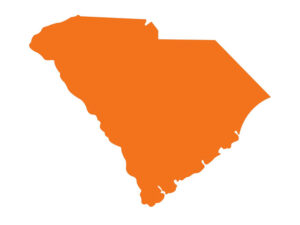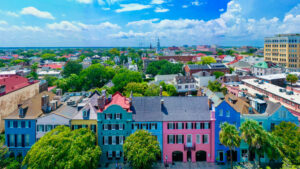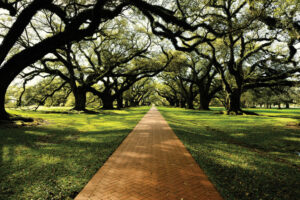
 South Carolina is a popular tourist destination among many Americans, with its sandy shoreline at Myrtle Beach and quaint historic cities like Charleston the very definition of Southern character. But as residents of the state know, there’s more to South Carolina than a vacation spot.
South Carolina is a popular tourist destination among many Americans, with its sandy shoreline at Myrtle Beach and quaint historic cities like Charleston the very definition of Southern character. But as residents of the state know, there’s more to South Carolina than a vacation spot.
“The antithesis between a technical and a liberal education is fallacious. There can be no adequate technical education which is not liberal, and no liberal education which is not technical.”
- Mathematician and philosopher Alfred North Whitehead
Of course, the importance of the tourism sector should not be discounted. Developing and maintaining a role as a thriving travel destination while protecting the area’s quality of life, natural beauty, and historical integrity takes creativity, analytical thinking, and strategic decision-making, all skills that are foundational to a liberal arts education.
South Carolina’s workforce has come a long way from farms, textile mills and factories. While manufacturing and agriculture remain active industries in the state, innovative thinkers are making groundbreaking advances in both fields with agribusiness and advanced manufacturing. Progress is also being made in aerospace, computer science, biotechnology, and so much more in South Carolina. Liberal arts graduates are primed to begin exciting work in the state with their ability to collaborate and contribute effectively within the communities at work.
The state attracts global employers with low or no taxes on many aspects of doing business. High-earning companies such as ScanSource and Sonoco Products operate in the state, along with countless small businesses that rely on well-rounded college grads to continue to grow.
Become Part of the Film, Media and Performing Arts Scene in South Carolina with a Degree in Liberal Studies
 The state’s population centers of Charleston, Columbia, and Greenville along with many smaller communities in the state are brimming with the arts, both fine and performing, allowing for a healthy and robust arts atmosphere that any liberal arts student would appreciate.
The state’s population centers of Charleston, Columbia, and Greenville along with many smaller communities in the state are brimming with the arts, both fine and performing, allowing for a healthy and robust arts atmosphere that any liberal arts student would appreciate.
The Greenville County Museum of Art, the Gibbes Museum of Art in Charleston, the Columbia Museum of Art, and the South Carolina State Museum of Art are some of the collections in the state that represent South Carolina’s rich culture and historic traditions.
Local and national productions are presented at numerous performing arts centers throughout the state including the Koger Center for the Arts in Columbia and the Peace Center in Greenville, and major events are at large venues like the North Charleston Coliseum and the Colonial Life Arena in Columbia. Along with many local festivals held every year, the Spoleto Festival USA in Charleston is one of the country’s major performing arts events.
While this makes entertainment and enrichment easy to find, it also generates jobs in the arts. South Carolina’s creative industries generate billions of dollars for the state’s economy, according to the South Carolina Arts Commission.
The diversity of ideal filming locations–from mountains to beaches, rural areas to urban centers, jungles to historic Antebellum buildings–attract filmmakers to the state. According to the South Carolina Film Commission, hundreds of feature films and television series have been shot in South Carolina, not to mention more than 500 print shoots. The state’s qualified talent and crew base, staffed by many liberal arts graduates, and a cooperative government with one of the country’s leading production incentives programs have production companies coming back again and again.
Film enthusiasts – or just anybody who appreciates ‘80s classic films – would be happy to know that Bill Murray calls Charleston home.
For high school students who may go on to liberal arts programs with a focus on film and media at liberal arts colleges in South Carolina, the state offers an exciting chance to get exposure and win prizes in the annual South Carolina Young Filmmakers Project competition and get a head start on making a name for themselves in the state’s film community.
Liberal arts students and graduates find South Carolina’s art scene easy to love.
Join the Scientific Community in South Carolina with a Degree in the Liberal Arts and Sciences
South Carolina is not new to innovation. The state can claim the first submarine, the first city to have an uninterrupted supply of power, the first patented antibody labeling agent to diagnose infection, and the first neutrinos detected. South Carolina’s scientists are continuing this tradition of invention.
The state has an Innovation Plan in place to foster advancements in the scientific community, and graduates from liberal arts colleges in South Carolina are ready to join in on this chance to be supported in their scientific work.
With a history in manufacturing, South Carolina is the natural place for studying and progressing advanced manufacturing, which transfers science and technology to manufacturing products and processes. This requires the engineering, maintenance and management of robots, and the understanding of manufacturing processes and needs. Connecting intricate concepts and ideas that cross disciplines is exactly what a liberal arts degree prepares people for.
The Information Technology field has a long history in the state. The information systems firm PMSC started in South Carolina, and software companies such as Blackbaud, ChartSpan, and Boomtown also call the state home. Computer hardware and software are being constantly advanced by the corporate endeavors in the state.
Multiple life sciences start-ups in the state are involved with drug and medical device development, which often includes partnering with academic research facilities at South Carolina universities. The final phase in providing the products to the market is manufacturing, which benefits from the advanced manufacturing practices in South Carolina.
Interdisciplinary fields come together to solve problems through collaboration and an integration of perspectives from different disciplines. This is a cornerstone concept of a liberal arts degree program.
Coastal science has also seen enormous strides in South Carolina over the years. There have been advances in how scientists record, measure, and process data. These include supercomputers, high-tech utility vehicles such as the RAMbLr created by the Charleston District of the U.S. Army Corps of Engineers, drone-based image technology, and nanotechnology.
Science specialists with a liberal arts background that broadens the mind and provides students the ability to interpret data in creative ways and think beyond a narrow scope of study are needed in the rapidly changing and overlapping fields of scientific work in South Carolina.
How a Liberal Arts Education in South Carolina Can Prepare You to Work in the Social Sciences
 The state’s communities need activists and professionals in the social sciences to work toward improving the lives of South Carolinians. While the quality of life in general is high in the state, there are always opportunities for improvement.
The state’s communities need activists and professionals in the social sciences to work toward improving the lives of South Carolinians. While the quality of life in general is high in the state, there are always opportunities for improvement.
Overall healthcare in South Carolina has problems that need to be solved. With a teen birth rate, infant mortality rate, and obesity rate that are higher than average, South Carolina needs powerful programs and talented public health professionals to spur change.
There are populations of children and elderly people living in poverty, a problem which will take social workers, economists, and policymakers to solve. Rural communities have needs that differ from urban ones, and liberal arts graduates are skilled in examining issues from different perspectives and finding original solutions.
Colleges of Liberal Arts in South Carolina Offering Bachelor’s and Master’s Degrees
Anderson University Anderson, SC
- Liberal Arts and Sciences, General Studies and Humanities, Other
- Undergraduate and Graduate Degrees
In Upstate North Carolina, Anderson University’s mission is based on a commitment to the four pillars of academics, faith, hospitality, and purpose. All of the selective, comprehensive Christian liberal arts university’s degree programs have students specialize in something. Its College of Arts and Sciences is focused on teaching the basic disciplines of specialized fields so that students gain a full appreciation of the liberal arts. Students are taught skills in critical thinking, communication, logic, and rhetoric along with a breadth of knowledge to apply to their future careers as well as their family and church lives. Anderson is one of the “best value” schools among regional universities, according to the U.S. News & World Report.
Columbia College Columbia, SC
- Liberal Arts and Sciences/Liberal Studies
- Undergraduate and Graduate Degrees
Located in the vibrant capital city of Columbia, Columbia College provides a personalized education on an intimate campus with one faculty member for every 11 students. In addition to a traditional campus education, the college provides evening and online liberal arts degree programs with individualized direction. The foundational liberal arts programs prepare students for successful careers, with 97 percent employed within six months of graduating. U.S. News & World Report has named it a “best value” college among regional universities. While Columbia has a history as a women’s college, the Methodist-affiliated university now welcomes both male and female students.
- Liberal Arts and Sciences/Liberal Studies, General Studies, Humanities/Humanistic Studies
- Undergraduate and Graduate Degrees
Columbia International University is a career-focused Christian college founded nearly a century ago. It has been named the best online college in South Carolina, with programs designed for working adults. Classes are small with the average size being just 18 and a student-faculty ratio of 10:1. The teaching style is hands-on and each class is taught from a Biblical worldview. It has been acknowledged as a military-friendly school and was ranked first in South Carolina by BestColleges.com.
Limestone University Gaffney, SC
- Liberal Arts and Sciences/Liberal Studies
- Undergraduate and Graduate Degrees
Limestone University is a non-denominational Christian university that educates students from diverse backgrounds in the liberal arts. In fact, it was the first women’s college in South Carolina, but is now coeducational. Degrees are made accessible to non-traditional students who may not have the time or ability to attend the campus by providing online and evening programs. The university teaches respect for learning, creativity, and hard work, as well as tolerance, personal integrity, and spiritual reflection.
Morris College Sumter, SC
- Liberal Arts and Sciences/Liberal Studies
- Undergraduate and Graduate Degrees
A historically black liberal arts college, Morris College offers a career-focused education. Founded in 1908 by the Baptist Educational and Missionary Convention of South Carolina, Morris College has the goal of producing graduates who go on to useful and productive careers that benefit society. The liberal arts and career-based programs have an emphasis on teacher education and allow students to master social, thinking, communication, math, technology, and leadership skills.
- Liberal Arts and Sciences/Liberal Studies
- Undergraduate and Graduate Degrees
North Greenville University is a Christ-centered college that cultivates leaders for church and society. Degrees may be earned online or on the campus near the Blue Ridge Mountains. The comprehensive university, which is affiliated with the South Carolina Baptist Convention, has a strong liberal arts tradition.






